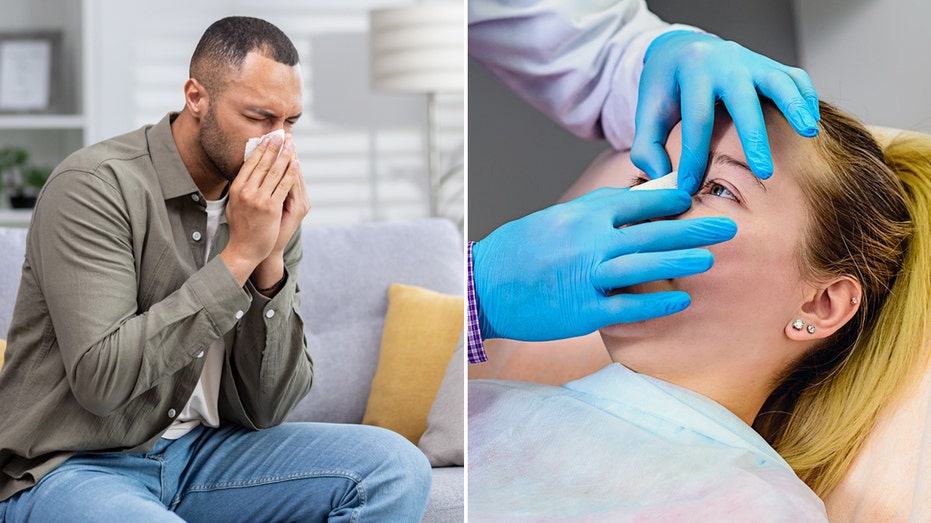Ask a doctor: 'Why am I getting nosebleeds and how can I stop them?'
Having a nosebleed can be startling and somewhat scary, but medical experts say the condition is generally not serious. Two doctors share common causes and signs of severe cases.

Having a nosebleed can be a startling and somewhat scary experience, but medical experts say the condition is generally not serious.
"Nosebleeds are quite common, and over half of the population will experience them at some point," David A. Gudis, M.D., chief of rhinology and anterior skull base surgery at Columbia University Irving Medical Center in New York City, told Fox News Digital.
"Most nosebleeds are not major medical emergencies, but they can be alarming and occasionally quite dangerous."
ASK A DOCTOR: ‘WHAT SHOULD I DO ABOUT FOOT BLISTERS?’
Here's what to know.
The lining of the nasal cavity (the "mucosa") has a very robust blood supply, and various causes can lead to bleeding from this area, according to Gudis.
"In children, the front of the nasal cavity is susceptible to irritation from doing what everybody does – nose-picking," he said.
In adults, this area of the nose can become dry, resulting in a thinning of the mucosa over these blood vessels.
ASK A DOCTOR: ‘IS IT EVER OK TO TAKE SOMEONE ELSE’S PRESCRIPTION MEDICATION?’
Another cause, Gudis said, could be a deviated septum, which is when the wall that separates the left and right sides of the nose is off-center or crooked.
This "can cause the airflow in the nose to be more turbulent, which can further dry out the front of the nose," the doctor said.
Trauma or injury to the nose — such as getting hit in the face with a ball or being involved in an accident of some type — can also result in nosebleeds, he added.
Medical issues are another potential trigger.
ASK A DOCTOR: 'WHY ARE MY HANDS SWELLING AND WHAT SHOULD I DO ABOUT IT?'
"These may include uncontrolled hypertension (high blood pressure), anticoagulant medication (blood thinners) and bleeding/clotting disorders," Gudis told Fox News Digital.
Beyond these reasons, a person's environment may be the culprit.
One common cause of nosebleeds is dry indoor air, said Natasha Bhuyan, M.D., a family physician with One Medical in Phoenix, Arizona.
"We tend to see this the most in the wintertime," she told Fox News Digital.
One way to prevent this is to use a humidifier.
In terms of overall prevention, it’s best to stay hydrated and keep the nasal passage moist, experts advise.
"Also, avoid picking inside your nose — and, of course, people should avoid smoking tobacco," added Bhuyan.
"Holding pressure" is a simple and very effective solution to most nosebleeds, according to Gudis.
"The key is to hold pressure where the nose becomes soft, to pinch it closed," he said.
CLICK HERE TO SIGN UP FOR OUR HEALTH NEWSLETTER
In many cases, individuals don’t know the best protocol to stop a nosebleed.
"Many people are erroneously instructed to pinch the ‘bridge’ of the nose — but squeezing the hard nasal bones does not transmit pressure to the actual source of bleeding," Gudis noted.
If the bleeding is persistent, heavy and doesn’t stop — or if you start to have other symptoms, such as lightheadedness or nausea — it’s best to seek medical attention right away, advised Gudis.
If nosebleeds occur frequently or take a long time to stop, don’t hesitate to seek medical care with an otolaryngologist (an ear, nose and throat specialist), he said.
For more Health articles, visit www.foxnews/health
"In the office, we can use small nasal endoscopes to identify the source of bleeding," Gudis told Fox News Digital.
In some cases, he said, patients require surgery to cauterize the blood supply to certain parts of the nose.


